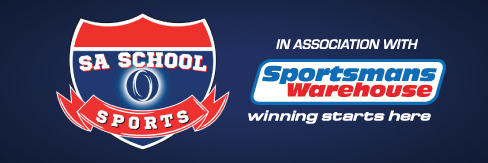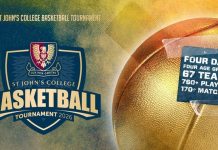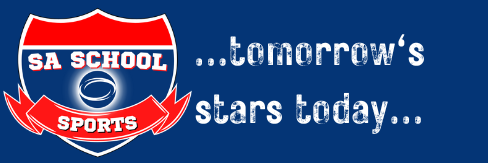The former Benoni High head boy arrived at Hilton last year.
“My job revolves around coordinating all co-curricular activities, with a specific focus on sport. This entails putting in place a high-performance programme that caters for the needs of our ‘social’ and ‘elite’ athletes,” says Gaffney, who was deputy headmaster and head of sport at St David’s Marist in Inanda, Johannesburg.
Hilton College sport is certainly on an upward curve. “Hilton College’s projects include the upgrading of sports facilities to include a new pool, a high performance centre, indoor sports centre, shooting range, and cricket wickets, whichwill see us near the completion of a high-quality sports precinct,” says the B.Ed Honours graduate in Educational Management.
“I guess you could say that coaching was in my blood from a very young age”
Gaffney says Hilton has a proud tradition of being a nursery for provincial and national sportsmen and a key component of his position at the school is to oversee coach and player development. Quality assurance is top of his agenda: “This will hopefully allow me to further develop our coaching staff in an attempt to ensure that they adopt a high-performance attitude that complements our high-performance programme.
“We provide our athletes with access to highly qualified coaches and sports science services. This, coupled with a sound infrastructure, will ensure that we are able to offer our athletes a quite unique experience. We understand that in the race for excellence there is no finish line and we take pride in being able to research current trends and plan for the future.”
It is clear that Gaffney is futuristic in his thinking and Hilton College appears capable of setting the benchmark across all sporting codes in years to come.
The man who has participated and served with distinction in a wide variety of sports, with a particular love for soccer and cricket, also has firm views on other issues pertaining to school sport. “A driven parent who aims to live his life through his child is going to be the single biggest factor in the child burning out or losing interest in sport,” he says. “Pressure is something that all individuals create and therefore can control. Parents, whether consciously or sub consciously, can be detrimental to their child’s performance without them even knowing it. A supportive parent who trusts and backs his or her child’s coaches will see the results.”
“The reward, for want of a better word, lies in seeing your boys achieve beyond the school”
Gaffney’s experience in coaching a number of sports is a huge positive, as he understands the needs of coaches. At age 15, he started coaching soccer at Farrarmere Primary School and Benoni High School, and won multiple league and cup trophies with these teams. “I guess you could say that coaching was in my blood from a very young age. Soccer and cricket have always been firm favourites and future goals include completing my Fifa International B licence and managing the SA U19 team to a Cricket World Cup.”
As to, why sport, why coaching/administering sport as a career; some would even go so far as to say, a vocation? “Sport has always been a passion and having realised at an early age that I have a love for, and talent, in developing young sportsman, I transferred my attention to coaching and sports administration.”
Does he see any advantages/disadvantages of a boy or girl (let’s stick to the masculine in the case of Gaffney’s job at Hilton) keen on sport being at school with a comparatively modest number of learners compared to schools with a significantly bigger number of learners? “The benefit for a boy attending a smaller private school lies in the fact that he is not a statistic, and in that lies the advantage. Children don’t get lost in the system and that’s important. They can be more easily tracked through the age group. I would put Hilton in the comparatively modest number of learners category.”
attending a smaller private school lies in the fact that he is not a statistic, and in that lies the advantage. Children don’t get lost in the system and that’s important. They can be more easily tracked through the age group. I would put Hilton in the comparatively modest number of learners category.”
Hilton College’s Dean of Sports takes the theme further: “Athletes develop at different stages, making it important for skills development to take place for all the boys, no matter which team they are in. By the time they get to the Open age group and are more physically developed, you’ll be surprised how many lower age-group-ranked players are elevated to first teams.”
Gaffney says the “A” team coach is effectively responsible for developing and growing the entire age group. “He does this through a process of skills development sessions, normally the first session of the week, and through this ensures that all boys acquire the necessary basic skills to play first team in their respective sports. The standard of coaching for all teams needs to be the same – and smaller schools achieve this more easily.”
What does his career give back to him? “The reward, for want of a better word, lies in seeing your boys achieve beyond the school. I have always prided myself in inspiring young athletes to understand that sport is a potential career and I have numerous boys playing professional sport. M. Matshikwe, D. Hendricks and T. Bavuma (former St David’s boys) are all playing cricket for the Highveld Lions and T. Ferland (Moroka Swallows), M. Sono, B. Burds (Jomo Cosmos) have all had successful professional starts in soccer. J. de Freitas and T. Mathlowa (both at Wits and formerly of St David’s) will, I believe, be the next big things in SA soccer, along with B. Burd. Talent scouting across cricket and soccer has always been a strength of mine. I don’t know why? T. Curran, B. Pfaff and L. Ngidi (Hilton College boys) will be ones to watch in the next few years. They all have tremendous cricketing ability and who knows what lies ahead. I’ve always been of the opinion that, if we are producing provincial or national players beyond school then the results will look after themselves. A South African Schools’ cap opens many doors and presents opportunities for a career in their chosen sport. I always highlight the importance attaining a degree as whilst a professional career is a very real option, it only lasts for a short period of time.”
Some school teachers and even school coaches have expressed disquiet as to the “professionalism” that is taking hold in school sport; where prep/primary school boys are offered sports bursaries? “For as long as I can recall scholarships have been awarded at Grade 8 entry level. These awards are made across academic, sporting and cultural spheres of school life. Some schools have funding available to offer scholarships at Grade 10 entry level across these same spheres. It has been done for years and I have no doubt that it will continue for years to come. ‘Poaching’ is a reality but, I would argue, is limited to, in most instances, rugby. I’m not sure that this being driven by schools or your franchises who are identifying talented players from in and around the country and placing them in schools. I think that your top rugby schools are taking full advantage of this opportunity. My concern really revolves around a boy who goes through a school system only to be discarded in his senior years. What message are we sending? I know this is top of the agenda when the Headmasters meet.”
One point of view is that schools use success in sport as the major marketing tool in attracting boys and their parents to go to that particular school. Success in academics appears to take a back seat to success in sport as the deciding factor or “emotional factor” in determining which school a boy will go to. From a purely marketing point of view, it is the right option, as there is far more attention from the media given to school sport than academic or cultural success. What is your opinion on this issue? “Educational institutions have a responsibility to provide a balanced education. Celebrating the success of all our achievers across academic, sporting and cultural spheres is Hilton College’s strength and a powerful marketing tool. Some schools use sport as a marketing tool and that’s a choice they make.”
In some schools, is there too much pressure from parents – and school staff, even – for boys to win matches rather than seeing victory as a bonus in the wider philosophy of offering the boys healthy physical activity? “Our sports vision focuses on developing better sportsman through the provision of a high-performance programme that caters for the needs of our ‘social athletes’ and our ‘elite athletes’. We hope to achieve this through developing and providing highly qualified coaches, through the provision of world-class facilities and providing our boys with access to sports science services. At Hilton College we go on to the field and our goal is to win every game, understanding however, that some of our greatest performances may well be in the face of defeat.”
Is recruiting professional coaches who are not school teachers healthy? The youth at the more well-equipped schools in South Africa first experience sport through school sport, while the majority of children in Australia and the UK, for example, experience sport through the club age-group system. Is there any advantage/disadvantage in either system? “The SA Schools’ system ranks as probably the best in the world and has a proud tradition of producing national players. I think that if we had a university system to match our schools sports structures, we as a nation would be unplayable. Australia has the youth-at-clubs rather than youth-at-schools system we have, and their later success is an enviable one.”
Does SA place too much emphasis on winning in school sport, at the expense of learning the correct technique above all? “We are a sports-mad nation and by our very nature we are competitive and demand results. I think it’s a societal thing. It’s how we as educators handle it that’s important. We are the gatekeepers of all that is good about sport and need to take responsibility for ensuring that no result, no single win, is as important as the lessons our children derive from participating in organised sport.”





